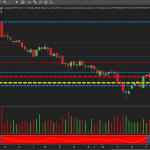Traditional Markets
Talk of a trade war between the two largest economies in the world has brought stocks to their knees at the end of last week.
The powers that be have been working hard to convince the markets that the extent of the trade wars has been overplayed.

So the hope is that even though Trump is talking tough, we may yet come out of this relatively unscathed. Indeed, the retaliation from China against the steel and aluminum tariffs was seen as rather light-handed. Still to come is the retaliation for the additional $60 Billion worth of tariffs that are likely to be imposed on China in the next two weeks.
Donald Trump has given the US’s closest allies (Canada, Mexico, Australia, Argentina, Brazil, South Korea, and Europe) a temporary extension on the Steel and Aluminum tariffs. So we can expect further bargaining and posturing leading up to the new deadline on May 1st.
According to Nobel prize-winning economist Rober Shiller, the longer this plays out, the worse the effects.

According to Shiller, it’s the uncertainty of the future that causes the most damage. Not knowing what the landscape will look like over the next few years will cause many businesses to adopt a wait and see attitude towards global trade, which is very bad for business.
Stock index’s this morning are rushing in to buy the dip. After the extreme lows of late Friday bargain hunters are out looking for a bounce.

We might also see some of the focus shifting from geopolitics to central banks as no less than three Fed members are scheduled to speak this evening.
Oil’s Strained Relationship
The relationship between crude oil and the US stock market was as strong as ever in the second half of 2017. However, since the recent volatility spouts in mid-February, it seems that this relationship is under extreme pressure.
Here we can see WTI crude oil against the S&P 500 since July. Notice how they’ve been traveling together for most of the time. But since the beginning of March are actually going in opposite directions.














Leave A Comment